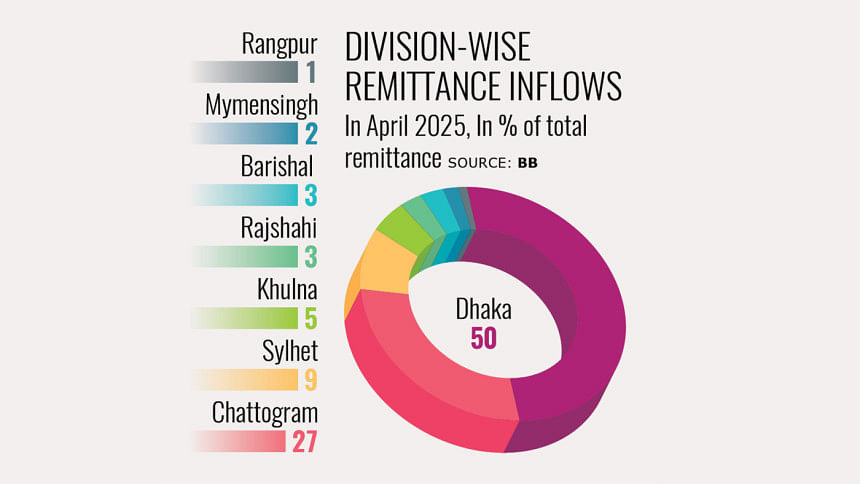Over 75% of April remittance went to Dhaka, Ctg

Dhaka and Chattogram divisions received over three quarters of the remittance sent by Bangladeshis living abroad in April this year, while six other divisions accounted for 27 percent of the total.
Dhaka alone received half of the total remittance of $2.75 billion received in the month.
Dhaka and Tangail were the division's two main districts in terms of the largest amounts of remittance inflows, which have become a cornerstone of Bangladesh's economy and serve as one of the largest sources of foreign exchange.
The southeastern division of Chattogram received 27 percent, according to a monthly report on remittances by Bangladesh Bank (BB) released earlier this month.
Bangladeshis living abroad sent $0.73 billion to Chattogram division, within which Chattogram and Cumilla districts were the top two recipients.
Among the remaining divisions, Sylhet received $0.23 billion, or 9 percent of the total, followed by Khulna, Barishal, and Rajshahi divisions, according to the BB report.
Overall, the $2.75 billion sent as remittance in April reflected a decline of 16.49 percent from that of March 2025.
However, the inflow marked a significant year-on-year increase of 34.64 percent, meaning from that of April 2024.
From July to April of the ongoing fiscal year of 2024-25, the total remittance inflow stood at $24.53 billion, representing a 28.34 percent year-on-year increase.
The United States was the largest source of remittance during the period, followed by the United Arab Emirates and Saudi Arabia.
The BB report noted that approximately 1.30 crore Bangladeshi nationals are currently working in various parts of the world.
As inflation, exchange rate volatility, and rising import costs place pressure on the economy, remittance inflows have helped sustain foreign exchange reserves, ease liquidity constraints in the banking sector, and reduce reliance on external borrowing, the report said.
"Manpower export plays an important role in poverty alleviation and helps reduce unemployment—the core issue in a densely populated country like Bangladesh," it said.
The BB report also stated that workers' remittance inflows have been crucial for maintaining economic stability, particularly in the face of global economic uncertainties and domestic challenges.
"In the current political and economic landscape, marked by inflationary pressures, exchange rate fluctuations, and rising import costs, remittances have provided much-needed relief by bolstering foreign currency reserves and supporting millions of households across the country," it said.

 For all latest news, follow The Daily Star's Google News channel.
For all latest news, follow The Daily Star's Google News channel. 



Comments